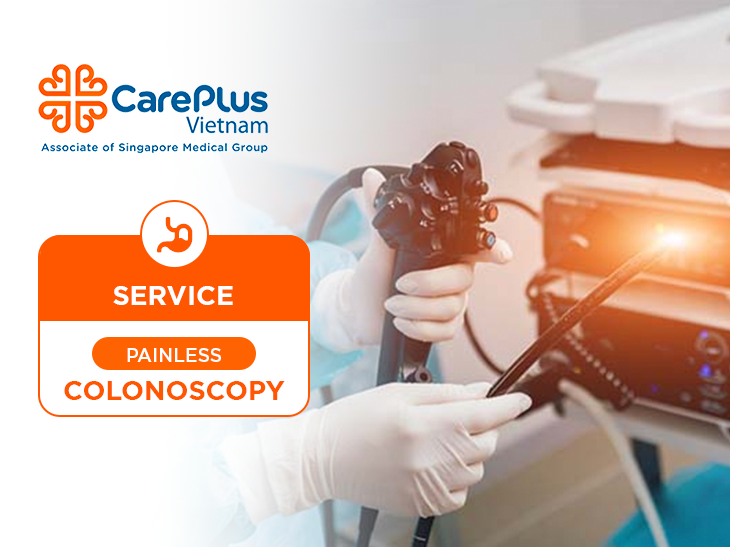Painless Colonoscopy

WHAT IS COLONOSCOPY?
Colonoscopy is a safe procedure that allows for direct observation of the colon (large intestine) mucosa using a flexible tube equipped with a camera inserted through the anus. Through images displayed on the endoscopy machine, doctors can observe, classify the extent of damage, and accurately diagnose conditions. This enables them to determine appropriate treatment methods and directly intervene in any lesions.
Colonoscopy can help doctors detect very small lesions, sometimes just a few millimeters in size, which other methods such as ultrasound, CT scans, MRI, or X-rays may overlook.
WHAT IS PAINLESS COLONOSCOPY?
Painless Colonoscopy is an advanced and modern endoscopic technique, which addresses the shortcomings of traditional endoscopy.
Advantages of painless endoscopy:
Pain-free experience: There is no sensation of pain, reducing anxiety. Patients do not experience discomfort, nausea, or the urge to cough or gag as with conventional endoscopy methods.
Precision: With painless endoscopy, patients remain still, ensuring clear and accurate images, facilitating the endoscopy process.
Safety: Depending on each specific case, the doctor will determine the appropriate dosage of sedative medication for short-term sedation, ensuring safety and not adversely affecting health. Pain-free endoscopy is recommended by the American Gastroenterological Association and endorsed by the Asian Pacific Association of Gastroenterology.
WHO SHOULD UNDERGO COLONOSCOPY?
Colonoscopy is indicated for patients suspected of having issues with the digestive tract (anus, rectum, colon). For each case, the doctor will consider the patient's health status and related issues to determine the need for colonoscopy.
The recommended age for individuals at average risk to begin cancer screening with endoscopy is currently between 35 and 45 years old.
Having close family members (grandparents, parents, siblings) with gastrointestinal diseases such as esophageal cancer, stomach cancer, or colorectal cance, multiple polyps in the digestive tract.
Symptoms such as passing mucus or blood stools (especially if suspected of rectal cancer or colon cancer), unexplained weight loss, changes in bowel habits, anemia.
Abnormal findings on colonoscopy or ultrasound.
Intervention or follow-up treatment is required.
DISEASES DETECTABLE BY COLONOSCOPY SERVICE:
Evaluation of benign conditions in the lower digestive tract such as hemorrhoids, anal fissures, anal prolapse, ulcerative colitis, diverticulosis, irritable bowel syndrome, etc.
Screening for colorectal polyps and follow-up after treatment.
PROCEDURE FOR CONDUCTING PAINLESS COLONOSCOPY
Preparing
Before undergoing Colonoscopy, patients will undergo a health check by doctors to ensure they are fit for the procedure. Sometimes, patients may need to undergo certain necessary clinical tests.
Patients should also inform the doctor if they are pregnant or suspect they are pregnant.
Patients are instructed to "take bowel preparation medication" before the colonoscopy.
Performing
Patients are instructed to lie on their left side with their knees bent towards their abdomen.
Sedative medication will be administered intravenously to limit discomfort during the colonoscopy.
The doctor will insert the endoscope into the colon through the anus and then inflate the colon with air to facilitate observation.
During the colonoscopy, patients may feel discomfort or abdominal cramps. Patients should remain calm, lie still, and take deep breaths. This discomfort will disappear after the colonoscopy is completed.
The colonoscopy procedure usually takes 30-60 minutes, depending on the specific condition of each patient.
After Colonoscopy:
Patients are monitored until they are fully awake.
Symptoms after colonoscopy may include a feeling of dull abdominal pain, bloating, or the urge to defecate but unable to. If there is polyp removal or biopsy, small traces of blood may be seen in the stool. These are normal symptoms and will quickly disappear, so patients do not need to worry. However, if there are severe symptoms such as fever, dizziness, severe abdominal pain, or passing a lot of blood in the stool, patients should inform the medical staff immediately.
After fully waking up, patients meet with the doctor to receive the colonoscopy results, prescription medication, schedule follow-up appointments (if necessary), and receive instructions on diet and health monitoring.